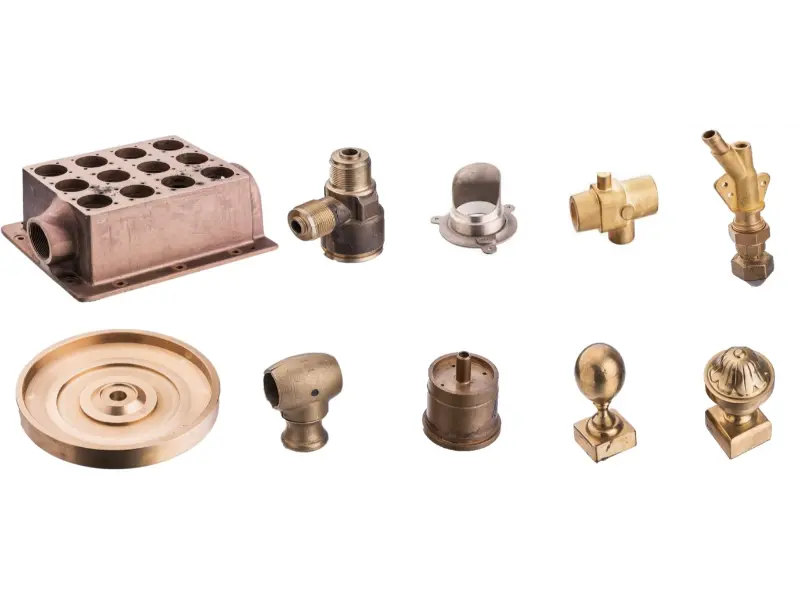What Material is Used for Gravity Die Casting?
Introduction
Gravity die casting is a popular casting process that relies on gravity to fill the mold with molten metal, creating high-quality parts with precision. One of the key aspects of successful gravity die casting is selecting the right material for the process. Different materials bring unique properties that make them suitable for specific applications, depending on factors like strength, durability, and resistance to corrosion. In this article, we’ll explore the best materials used for gravity die casting and the benefits each brings to the manufacturing process.
Common Materials Used in Gravity Die Casting
Gravity die casting typically utilizes non-ferrous metals that offer a good balance of strength, durability, and fluidity. Let’s dive into the most commonly used materials and their properties.
1. Aluminum Alloys
Aluminum is one of the most popular materials for gravity die casting due to its unique properties:
- Lightweight: Aluminum’s low density makes it ideal for applications where weight reduction is essential, such as in the automotive and aerospace industries.
- Corrosion Resistance: Aluminum forms a natural oxide layer, providing excellent resistance to corrosion, which is valuable for outdoor and marine applications.
- High Thermal Conductivity: Aluminum’s thermal conductivity makes it suitable for heat-sensitive applications, such as radiators and heat exchangers.
- Application: Gravity die cast aluminum components are commonly used in automotive parts, electrical enclosures, and appliance components.
2. Zinc Alloys
Zinc alloys are also frequently used in gravity die casting due to their versatility and cost-effectiveness:
- Low Melting Point: Zinc’s lower melting point means it requires less energy to cast, making it an economical choice for medium to high-volume production.
- Dimensional Stability: Zinc castings offer excellent dimensional accuracy, making them ideal for intricate and complex designs.
- Good Mechanical Properties: Zinc is durable and resistant to wear, which extends the lifespan of components under regular use.
- Application: Zinc die cast parts are widely used in hardware, automotive components, and electronics due to their strength and precision.
3. Copper and Copper Alloys (Bronze and Brass)
Copper and its alloys, such as bronze and brass, are preferred in applications requiring excellent electrical and thermal conductivity:
- Electrical Conductivity: Copper’s high conductivity makes it an ideal choice for electrical applications.
- Corrosion Resistance: Bronze and brass provide good resistance to corrosion, especially in marine environments.
- Aesthetic Appeal: Brass and bronze castings offer an attractive finish, making them suitable for decorative applications.
- Application: Gravity die cast copper and brass components are used in plumbing fittings, electrical connectors, and decorative items.
4. Magnesium Alloys
Magnesium alloys are gaining popularity in gravity die casting due to their unique properties:
- Ultralight Weight: Magnesium is the lightest structural metal, making it ideal for applications where weight is a critical factor, such as in aerospace and automotive industries.
- High Strength-to-Weight Ratio: Despite being lightweight, magnesium alloys offer good strength, making them suitable for structural applications.
- Machinability: Magnesium is highly machinable, which reduces costs in post-production machining.
- Application: Magnesium cast parts are commonly used in automotive, electronics, and aerospace industries.
Factors to Consider When Choosing Materials for Gravity Die Casting
When selecting materials for gravity die casting, it’s important to consider the specific requirements of the application. Here are some critical factors that influence material choice:
1. Strength and Durability Requirements
Each alloy offers different levels of strength and durability. For example, aluminum is strong and lightweight, making it ideal for structural components, while zinc is excellent for components needing high dimensional stability.
2. Corrosion Resistance
If the casting is intended for outdoor or marine environments, materials like aluminum and brass, which have natural corrosion-resistant properties, are preferable.
3. Thermal and Electrical Conductivity
Materials like copper and aluminum are highly conductive, making them suitable for applications requiring thermal management or electrical conductivity, such as heat sinks and electrical connectors.
4. Cost-Effectiveness
Zinc and aluminum are cost-effective materials that provide good strength and durability. Magnesium, though more expensive, is lightweight and suitable for industries where weight reduction is essential.
5. Melting Point and Energy Efficiency
Zinc’s lower melting point means it requires less energy to cast, making it an economical choice. Aluminum and magnesium, although requiring more energy to melt, are popular due to their mechanical properties.
Conclusion: Choosing the Right Material for Gravity Die Casting
The material choice for gravity die casting plays a significant role in the quality, durability, and cost-effectiveness of the final product. Aluminum, zinc, copper, and magnesium alloys each offer distinct advantages, and the choice largely depends on the application’s requirements, such as strength, weight, corrosion resistance, and thermal conductivity. By understanding the properties of these materials, manufacturers can select the best alloy to meet their needs and produce high-quality, precision castings.

